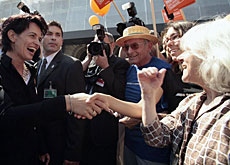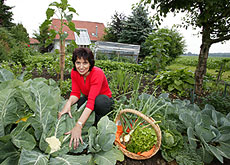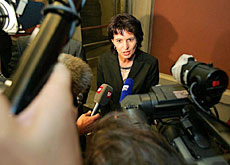Leuthard steps up to the cabinet

Doris Leuthard, a member of the centre-right Christian Democratic Party, has won election to the Swiss government after just one round of voting.
Leuthard is only the fifth woman to have won a seat in the federal cabinet. Her election by parliament on Wednesday was considered a foregone conclusion, but there was criticism of her political views and the fact she was the only official candidate.
Leuthard, who has led her party for two years, will take up her post in August, but the seven-member cabinet will only decide on Friday on her portfolio.
The 43-year-old politician replaces Christian Democrat Joseph Deiss. The economics minister had announced his surprise resignation in April.
Leuthard won 133 votes in the first round of balloting by a joint session of the House of Representatives and the Senate with a margin that is considered just average.
A relieved Leuthard said she was not disappointed at the size of the margin. “I knew that those on the extreme left and right would not vote for me,” she said.
Several speakers, notably from the Greens and small parties, said they were unhappy that Leuthard was the sole official candidate. Critics also said they were unclear on her political views while others described her as leaning too much to the right.
However, all the leading parties supported her candidacy.
Analysts point out that the Radicals, the Swiss People’s Party and the Social Democrats, which are represented in the cabinet, need the support of the Christian Democrats in general elections due at the end of next year.
Women and the young
In a brief personal statement in Switzerland’s four official languages, Leuthard said her election “was in recognition of women in politics and the younger generation”.
The 43-year-old trained lawyer considers herself to be a liberal on social issues but is more in line with conservatives on financial and economic matters.
She enjoys wide support within her own party and among the Swiss public and has often been praised for her charisma.
Leuthard was officially welcomed by her colleagues in the cabinet before she began an interview marathon in the lobby of parliament and finally joined a crowd of supporters.
Contributing to a festive atmosphere, hundreds of people, including Leuthard’s family and her party members from her native village of Merenschwand, gathered in parliament square and inside the building to celebrate her political success.
Leuthard grew up in a Catholic rural region between Zurich and Lucerne and went into politics as a parliamentarian in her home canton of Aargau. In 1999 she was elected to the House of Representatives.
Leuthard is only the fifth woman of the 109 members to be elected to the cabinet since 1848.
Openness and reforms
In his farewell address to parliament the outgoing economics minister, Joseph Deiss, called for openness and solidarity in a multicultural society.
He reiterated that economic and political reforms were needed for Switzerland to keep its competitive edge and play a part as a moral authority on the international stage.
Deiss who was foreign minister between 1999 and 2003, said seeing the Swiss flag flying at the United Nations headquarters in New York for the first time was one of the most memorable moments in his political career.
The Swiss had approved UN membership in nationwide vote in 2002.
He also said he remained convinced that Switzerland should seek membership of the European Union.
swissinfo, Urs Geiser
Leuthard is only the fifth woman – among a total of 109 ministers – to be elected to the Swiss government.
She won 133 of the 242 votes in the House of Represenatives and the Senate.
The 43-year-old is a lawyer and became a parliamentarian in 1999 as a member of the Christian Democratic Party. In 2004 she took over the presidency of her party.
The Swiss cabinet is made up of seven members of the four main political parties. The ministers are elected in a joint session of both houses of parliament.
Candidates are not elected to ministries but to the cabinet which distributes portfolios according to the principle of seniority.
Ministers are elected to a four-year term. Resignations outside the regular schedule are a relatively rare occurrence.
The rightwing Swiss People’s Party, the centre-left Social Democrats and the centre-right Radical Party hold two seats each.
The centre-right Christian Democrats have just one seat after losing their second seat to the People Party in 2003.

In compliance with the JTI standards
More: SWI swissinfo.ch certified by the Journalism Trust Initiative




You can find an overview of ongoing debates with our journalists here. Please join us!
If you want to start a conversation about a topic raised in this article or want to report factual errors, email us at english@swissinfo.ch.